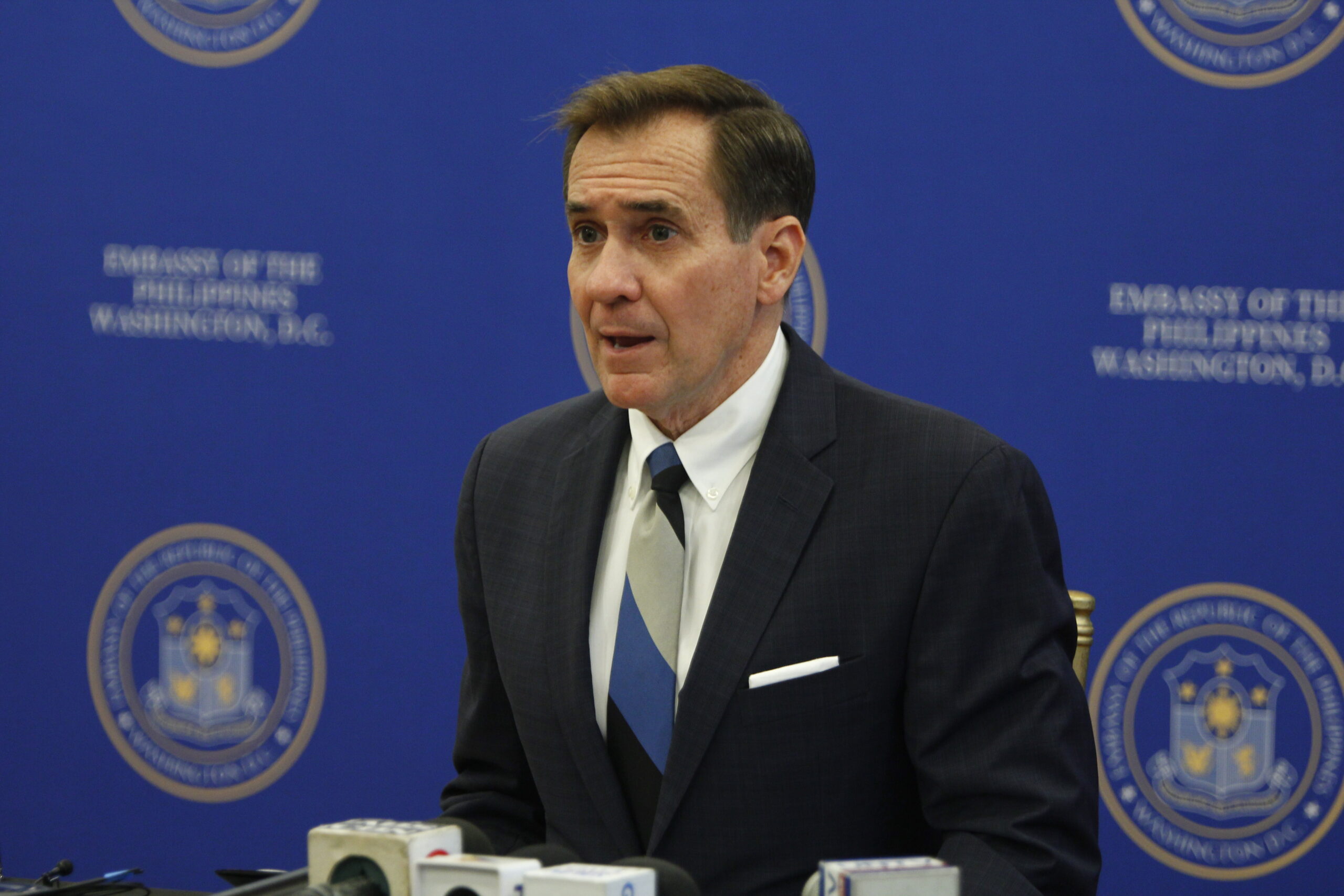China has no reason to overreact to US, allies’ patrol in WPS – Kirby

US National Security Council Coordinator for Strategic Communications John Kirby answers questions from Filipino reporters in Washington, D.C., United States, on April 10, 2024, a day before the first-ever trilateral meeting between the Philippines, United States, and Japan. Gabriel P. Lalu/ INQUIRER.net
WASHINGTON, D.C., United States — There is no reason for China to overreact to the quadrilateral exercises conducted by the United States (US), Philippines, Japan, and Australia because it was performed on free waters, a senior US official said Wednesday (Eastern time).
US National Security Council Coordinator for Strategic Communications John Kirby admitted in a press briefing at the Philippine Embassy here that the recent joint patrols came after rising tensions in the West Philippine Sea (WPS).
However, Kirby said there is no reason for China to fret because the activity was about freedom of navigation, adding that international law allows the US and its allies to sail in the area.
“I’d start by saying while certainly, these patrols come into context of the tensions over Second Thomas Shoal, they really are, also, again, of a piece of (US) President (Joe) Biden’s vision of improving multilateral cooperation in the region,” Kirby told reporters from the Philippine delegation.
Article continues after this advertisementREAD: Trilateral meeting not just about South China Sea row, says US exec
Article continues after this advertisement“And I can’t speak for the PRC (People’s Republic of China) reaction one way or another except to say there’s no reason to overreact to this. This is about freedom of navigation, it’s about adherence to international law, it’s about proving the simple point that we and our allies will fly, sail, and operate wherever international law permits us to do, and it does in the South China Sea, and we did,” he added.
Kirby said more patrols can be expected, but these will focus on adherence to international maritime laws.
“And I think you can look forward to additional opportunities for us to conduct those kinds of maritime patrols. But they are really about reconfirming a simple principle about international maritime law and international waters,” he said.
Kirby made these remarks after being asked about China’s possible intense reaction toward the April 7 joint maritime patrols conducted by the US and its allies in the West Philippine Sea.
China announced it will also conduct military “combat patrols” over the disputed waters on April 7 following the quadrilateral exercises. It also said that other military activities “that mess up the situation in the South China Sea and create hotspots” are under control – an apparent swipe at the US-Philippines-Japan-Australia activity.
Armed Forces of the Philippines (AFP) Chief-of-Staff General Romeo Brawner Jr. said the joint maritime activities of the four countries went unimpeded, saying it was not met with a “combat patrol” by China.
However, two People’s Liberation Army-Navy warships of China with bow numbers 792 and 162 were spotted tailing the vessels of the US, Philippines, Japan, and Australia. They were located six nautical miles off the coast of Busuanga in Palawan province, where the joint patrols were held.
Rising tensions in the West Philippine Sea amid the continued aggressive behavior of China are expected to take center stage during the trilateral meeting between the Philippines, the US, and Japan here on Thursday, April 11.
However, Kirby also said that while the US is concerned about security matters in the South China Sea, it is wrong to assume that the historic trilateral summit was only about the matter.
Kirby said in the same press briefing that many topics are on the table during the trilateral meeting, including economic partnerships and talks on strengthening ties between the countries.
“It’s easy to look at all this and I understand the desire to do it, with an eye towards China – and I’m not suggesting that. The tensions in the South China Sea are important and that we are concerned. I know (US) President (Joe) Biden is concerned about what we’re seeing in the PRC (People’s Republic of China), particularly in the South China Sea and these claims that they’re trying to pursue,” Kirby told reporters from the Philippine delegation.
“But what we’re really after in tomorrow’s meeting — both bilaterally and trilaterally — is deepening our partnerships for the good of the partnerships, for the good of the American people, the Japanese people, and certainly the Filipino people. It is not just — and you shouldn’t take away that these discussions are just all about China and or all about how to counter their growing aggressiveness,” he added.
For comprehensive coverage, in-depth analysis, visit our special page for West Philippine Sea updates. Stay informed with articles, videos, and expert opinions.